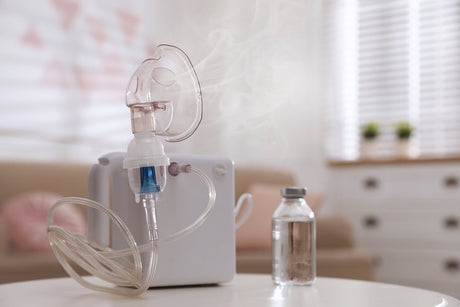Written by Nancy Kirk
November 11, 2024
November is National Family Caregivers Month, a time to recognize the invaluable dedication of caregivers. So, if that’s you—we applaud your dedication and hard work. At ApriaHome, we understand the journey can be challenging but also extremely rewarding.
This guide provides practical advice to improve your daily life, self-care tips, and recommendations for creating a safe and comfortable environment at your patient or loved one’s home. Let’s explore how you can support someone while caring for yourself.
Understanding Mobility Challenges
Mobility challenges can come in many forms, from a limited range of motion and balance issues to a full dependence on aids like walkers or wheelchairs. As you already know, this can make daily tasks—like making a simple snack or using the bathroom—significantly more difficult.
When working with those who use mobility aids, it’s important to always lead with empathy, compassion, and patience. Beyond physical limitations, your loved one may also experience frustration, anxiety, or a sense of loss. It’s important to stay positive while also understanding what challenges your patient or loved one may be going through.
10 Key Considerations as a Caregiver
Caring for individuals with mobility challenges involves more than just physical assistance. Here are key aspects to keep in mind:
- Encourage Independence: Help your loved one maintain their independence by encouraging them to participate in daily activities, like personal care or light chores, with adaptive tools if needed. Celebrate these efforts which can boost self-esteem.
- Create Rest Areas: Set up comfortable resting spots throughout the home. This can include stools or foldable seating, allowing your loved one to take breaks whenever needed.
- Enhance Lighting: Improve visibility in dimly lit areas with bright overhead lights or lamps. Utilizing energy-efficient LEDs not only brightens these spaces but can also lead to long-term savings on energy costs.
- Declutter Walkways: Make it a habit to remove any items that can cause tripping and falling, like loose cables or stray belongings.
- Easily Accessible Essentials: Put daily necessities like medications, snacks, and personal devices within reach. Using tools like reachers can help. If you live in a two-story home, try consolidating all necessities onto one floor.
- Secure Rugs and Mats: Wrinkled rugs can pose tripping hazards, so use skid-resistant options to keep them in place.
- Install Nightlights: Place nightlights strategically to help your loved one see clearly after the sun goes down.
- Upgrade Furniture: Replace low-seated furniture with higher options to make it easier for individuals with mobility issues to sit down and stand up with less effort.
- Implement Safety Features: Install grab bars and ramps in commonly used indoor and outdoor areas to assist with movement and prevent falls.
- Keep an Eye Out for Danger: Regularly check for spills or other obstacles, particularly in kitchens and bathrooms. Dry floors will help prevent slips.
Integrating these considerations into your caregiving approach can create a safer and more supportive environment for your loved one while promoting their independence and well-being.
How to Make Caregiving a Positive Experience
The caregiving journey is unique to every family and often comes with challenges and frustrations. Despite that, we can do our best to create a positive environment. Here are a few strategies for turning this experience into something positive:
Celebrate Small Wins: Recognize and appreciate even minor progress. Small victories, like improved mobility or a successful outing, can boost morale.
Maintain Routines and Traditions: Familiar routines provide stability and a sense of normalcy for you and your loved one. Keep up with family traditions whenever possible.
Engage in Meaningful Activities: Spend quality time together through activities you enjoy, like listening to music, doing puzzles, or reading aloud.
Adapting Your Mindset: Viewing caregiving as an opportunity to bond with and support your loved one can help you positively approach each day.
Prioritizing Yourself as a Caregiver
Maintaining your health as a caregiver is crucial, and it starts with simple actions. Taking care of your physical health can go a long way in boosting stamina and managing stress. This includes fitting in a quick walk around the block, eating balanced meals, scheduling regular check-ups for yourself, and taking time for your own hobbies.
Give yourself time to take short, daily breaks—even if it’s just for a few minutes to enjoy a coffee or get some fresh air. These small moments can make a big difference in how you feel. Self-care isn’t a luxury; it’s a necessity. Taking care of yourself allows you to avoid burnout, be a better caregiver, and live a more satisfying life.
Tips for Preventing Caregiver Burnout
As a caregiver, you may find it hard to make time for yourself. But remember—prioritizing yourself will make you a better caregiver! Not to mention, you deserve time to rest and reset after all your hard work. It’s all about balance. Here are ways to prevent caregiver burnout:
- Recognize the Signs: Symptoms like exhaustion, irritability, and difficulty concentrating are common signs of burnout. Being aware of these signs allows you to take action before it worsens.
- Create Boundaries: Boundaries can help maintain your sense of self outside of caregiving, like making sure you have time for personal space and mental health.
- Ask for Help: Don’t hesitate to ask family members, friends, or professionals for support. Caregiving is a team effort, and sharing responsibilities can make a significant difference.
- Create a Support Network: Connecting with others who understand your challenges can be uplifting. Consider joining online or local support groups for caregivers for advice and camaraderie.
Make Your Life Easier with these Essential Mobility Products
Creating a cohesive and safe home will make daily life easier for both you and the care receiver. Here are examples of specific products that can provide additional comfort and security in each room:
- Walkers or Rollators: These offer safer support for your loved one to move around - rollators can be easier to move given their wheels, and walkers can help provide some extra stability.
- Power or Manual Wheelchairs: Power wheelchairs or manual wheelchairs can allow more independence or make it easier to transport a loved one.
- Lift Chairs: These chairs help with sitting and standing, making it easier for you and your loved one.
- Mobility-Friendly Furniture: Opt for adjustable furniture that is easy to get in and out of.
- Adjustable Bed: Increase accessibility with adjustable beds and support pillows.
- Grab Bars and Handrails: Grab bars offer support around the toilet and shower.
- Shower Chairs: Shower chairs can be safer with reduced risk of slipping.
- Raised Toilet Seats: These raised seats add stability and reduce the need for help.
- Non-Slip Mats: These help prevent falls on slippery floors.
- Accessible Storage: Arrange items at waist level to prevent reaching and bending.
- Portable Stools: Allow for seated meal preparation and ease fatigue.
- Handrails and Guardrails: Great for moving between rooms, in bed, or in the bathroom.
- Low-Pile Carpets or Rugs: Reduce tripping hazards and make moving easier.
ApriaHome is Here To Support You
If you need additional support, ApriaHome is here to help! You play an invaluable role in the life of your loved one. Caregiving isn’t easy, but with the right support, resources, and mindset, it can be a fulfilling experience. ApriaHome is here to make sure you have the tools and support needed to care for your loved ones confidently.





